
SwiftSage
SwiftSage: A Generative Agent with Fast and Slow Thinking for Complex Interactive Tasks
Stars: 255
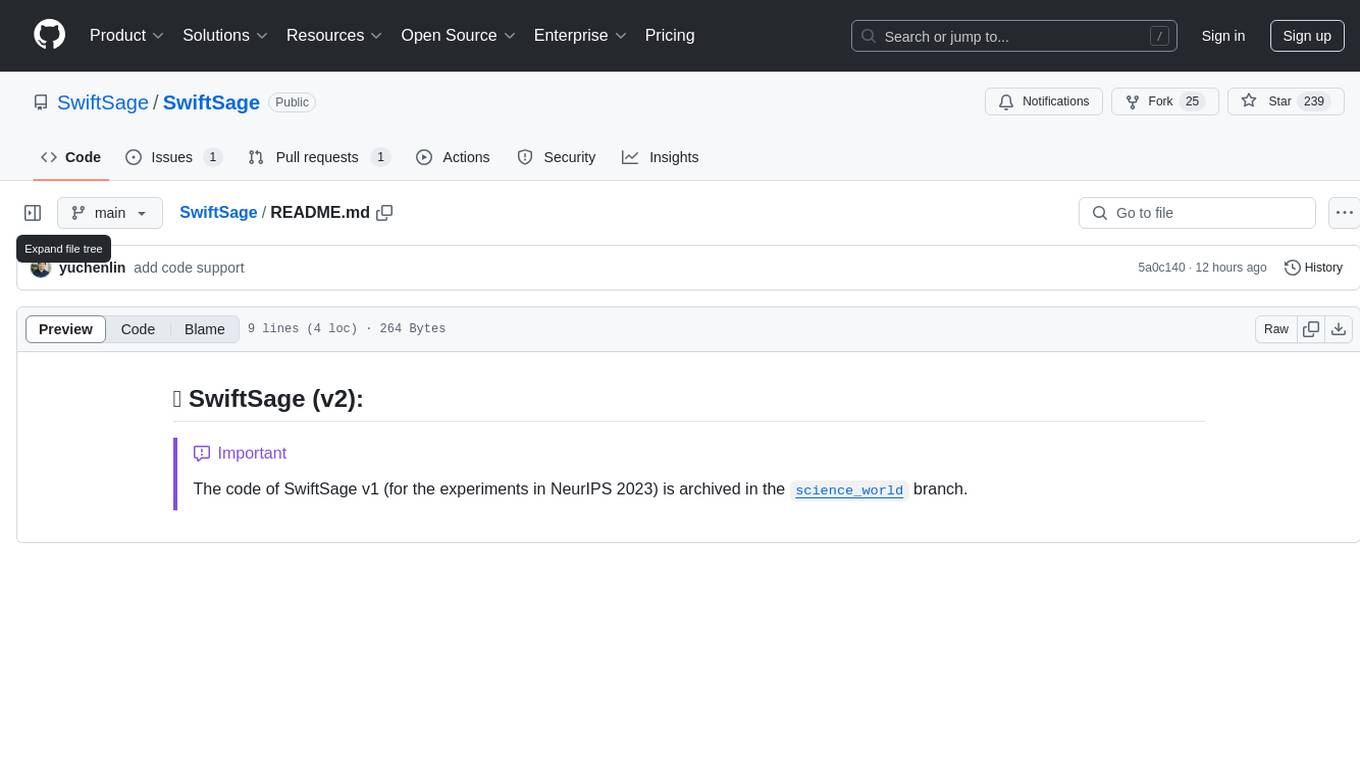
SwiftSage is a tool designed for conducting experiments in the field of machine learning and artificial intelligence. It provides a platform for researchers and developers to implement and test various algorithms and models. The tool is particularly useful for exploring new ideas and conducting experiments in a controlled environment. SwiftSage aims to streamline the process of developing and testing machine learning models, making it easier for users to iterate on their ideas and achieve better results. With its user-friendly interface and powerful features, SwiftSage is a valuable tool for anyone working in the field of AI and ML.
README:
[!IMPORTANT]
- This is the beta version of SwiftSage V2, which is still under development. The current version may not be stable and is subject to change. Any comments and suggestions are welcome!
- The code of SwiftSage V1 (for the experiments in NeurIPS 2023) is at
science_worldbranch.- 🔥 Our demo is now available on HuggingFace Spaces: https://hf.co/spaces/swiftsage-ai/SwiftSage.
- Gradio Demo on HuggingFace: https://hf.co/spaces/swiftsage-ai/SwiftSage
- Get your API key: Together AI, Groq, SambaNova, etc.
- Previous paper (NeurIPS 2023 Spotlight): https://arxiv.org/abs/2305.17390
- Core contributors for v2: Bill Yuchen Lin, Yifan Song, ....
pip install git+https://github.com/SwiftSage/SwiftSage.git
# alternatively, you can clone the repo and install it locally
# git clone https://github.com/SwiftSage/SwiftSage.git
# pip install -e .# export TOGETHER_API_KEY="your-api-key" # get your key from https://www.together.ai
export ENGINE="Together"
export SWIFT_MODEL_ID="meta-llama/Meta-Llama-3.1-8B-Instruct-Turbo" # can be 70B for more complex reasoning
export FEEDBACK_MODEL_ID="meta-llama/Meta-Llama-3.1-70B-Instruct-Turbo"
export SAGE_MODEL_ID="meta-llama/Meta-Llama-3.1-70B-Instruct-Turbo" # can be 405B for more complex reasoning
QUERY="How many letter r are there in 'My strawberry is red.'?"
# QUERY="9.9 or 9.11 -- which is bigger?"
# QUERY="How can you solve the quadratic equation 3x^2 + 7.15x + 4 = 0 using the quadratic formula?"
# QUERY="What is the capital of Australia?"
swiftsage --problem $QUERY \
--api_provider ${ENGINE} \
--swift_model_id ${SWIFT_MODEL_ID} \
--feedback_model_id ${FEEDBACK_MODEL_ID} \
--sage_model_id ${SAGE_MODEL_ID}[!Tip] Check more configurations in the code: swiftsage/cli.py.
The key motivation of SwiftSage is to provide a general reasoning framework that can mimic the fast and slow thinking processes in human cognition. The fast thinking process is based on the intuition and heuristic reasoning, while the slow thinking process is based on more analytical, critical thinking. Unlike SwiftSage V1, which relies on feedbacks from the well-designed environment such as ScienceWorld, SwiftSage v2 is designed to be more general and can be applied to various reasoning tasks.
[!Note]
- General reasoning. In order to support more general reasoning, we use Agent Lumos's idea to unify the task formats with a plan-ground-execute paradigm. Here to make our reasoning more general, we use Python executor as the execution engine, thus each action is a Python code snippet.
- In-context reinforcement. Instead of fine-tuning by behavior cloning ortrajectory optimization, we focus on tuning-free, prompting-based strategies to achieve the same goal such that it is easier to adapt to new LLMs and API-based LLM access. The feedbacks are generated by LLMs and are used as critics and rewards for SwiftSage to update their reasoning strategies.
The main components in SwiftSage v2:
- Swift Agent: A (smaller) LM that aims to solve the problem efficiently with intuitive reasoning.
- Feedback Agent: A (larger) LM that critiques the generated solution and provides feedback and reward signals.
- Sage Agent: A (even larger) LM that solves the problem by analytical thinking, if the Swift Agent fails.
- Executor: A Python executor that executes the generated code snippets to produce an answer.
- Retriever (soon to be added): A retrieval module that retrieves the most relevant tasks for the current prompt.
- Step 1. Given a reasoning problem input by a user, the Swift Agent first generates a plan and a code-based solution.
- Step 2. The executor runs the code snippet and produces the final answer.
- Step 3. The feedback agent then analyzes the generated answer and provides feedback, including a short paragraph and a score. Based on the score and a predefined threshold, we determine if the current solution is adequate to present to the user.
- Case 3.1. If yes, the process stops, and the answer is shown to the user.
- Case 3.2. If not, the critical feedback is used to prompt the Swift Agent to generate a new solution. Return to Step 1 with the feedback as the new prompt.
- Case 3.3. If the new solution is still inadequate after several iterations, proceed to Step 4.
- Step 4. If the Swift Agent cannot solve the task, the Sage Agent is used to address the problem in a more analytical manner, and the final answer is then provided to the user.
[!WARNING]
The Retriever is not yet implemented yet. Soon, we'll add retrieval augmentation step to further improve the reasoning process of Swift Agent in Step 1.
Please email Bill Yuchen Lin at the gmail address.
We use the MIT license for SwiftSage.
The technical report of SwiftSage V2 is under preparation. Please cite the following paper for the previous version of SwiftSage:
@inproceedings{
lin2023swiftsage,
title={SwiftSage: A Generative Agent with Fast and Slow Thinking for Complex Interactive Tasks},
author={Bill Yuchen Lin and Yicheng Fu and Karina Yang and Faeze Brahman and Shiyu Huang and Chandra Bhagavatula and Prithviraj Ammanabrolu and Yejin Choi and Xiang Ren},
booktitle={Thirty-seventh Conference on Neural Information Processing Systems},
year={2023}
}For Tasks:
Click tags to check more tools for each tasksFor Jobs:
Alternative AI tools for SwiftSage
Similar Open Source Tools

SwiftSage
SwiftSage is a tool designed for conducting experiments in the field of machine learning and artificial intelligence. It provides a platform for researchers and developers to implement and test various algorithms and models. The tool is particularly useful for exploring new ideas and conducting experiments in a controlled environment. SwiftSage aims to streamline the process of developing and testing machine learning models, making it easier for users to iterate on their ideas and achieve better results. With its user-friendly interface and powerful features, SwiftSage is a valuable tool for anyone working in the field of AI and ML.
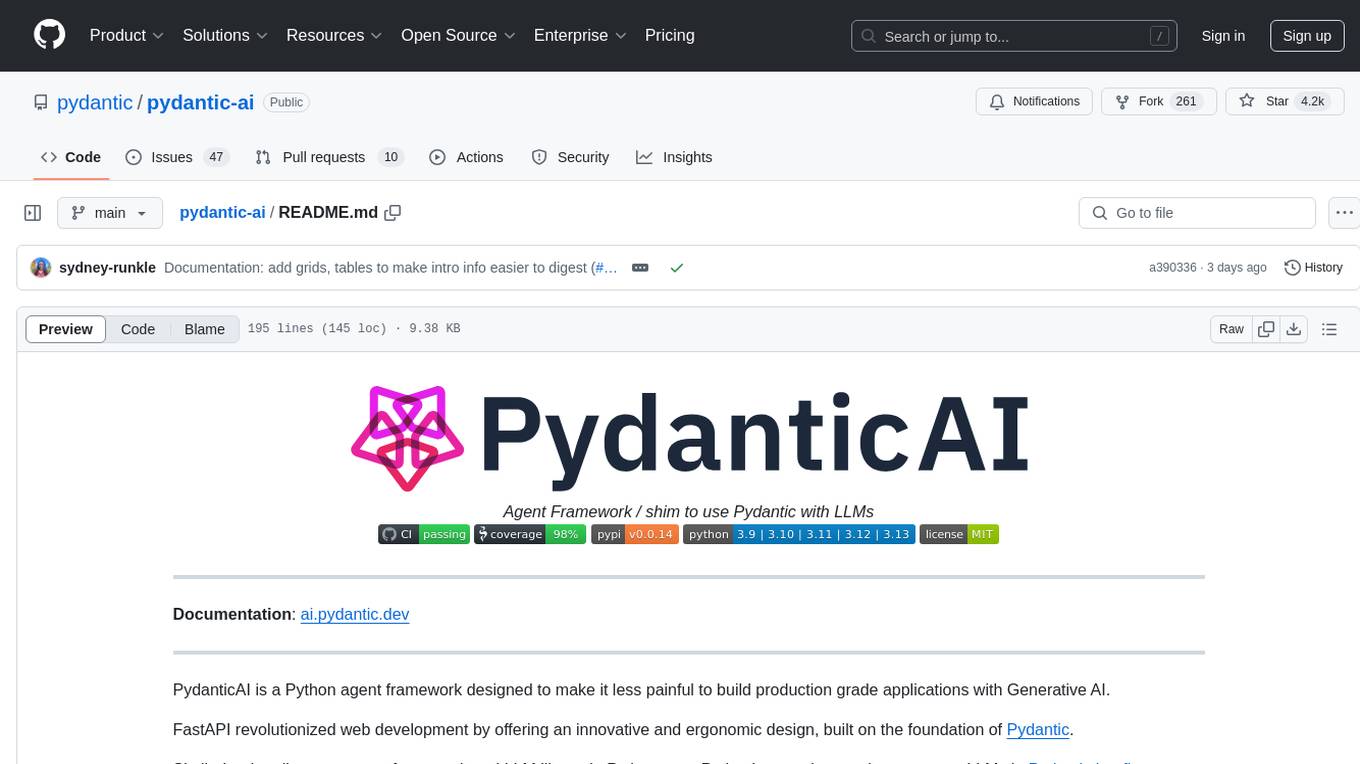
pydantic-ai
PydanticAI is a Python agent framework designed to make it less painful to build production grade applications with Generative AI. It is built by the Pydantic Team and supports various AI models like OpenAI, Anthropic, Gemini, Ollama, Groq, and Mistral. PydanticAI seamlessly integrates with Pydantic Logfire for real-time debugging, performance monitoring, and behavior tracking of LLM-powered applications. It is type-safe, Python-centric, and offers structured responses, dependency injection system, and streamed responses. PydanticAI is in early beta, offering a Python-centric design to apply standard Python best practices in AI-driven projects.
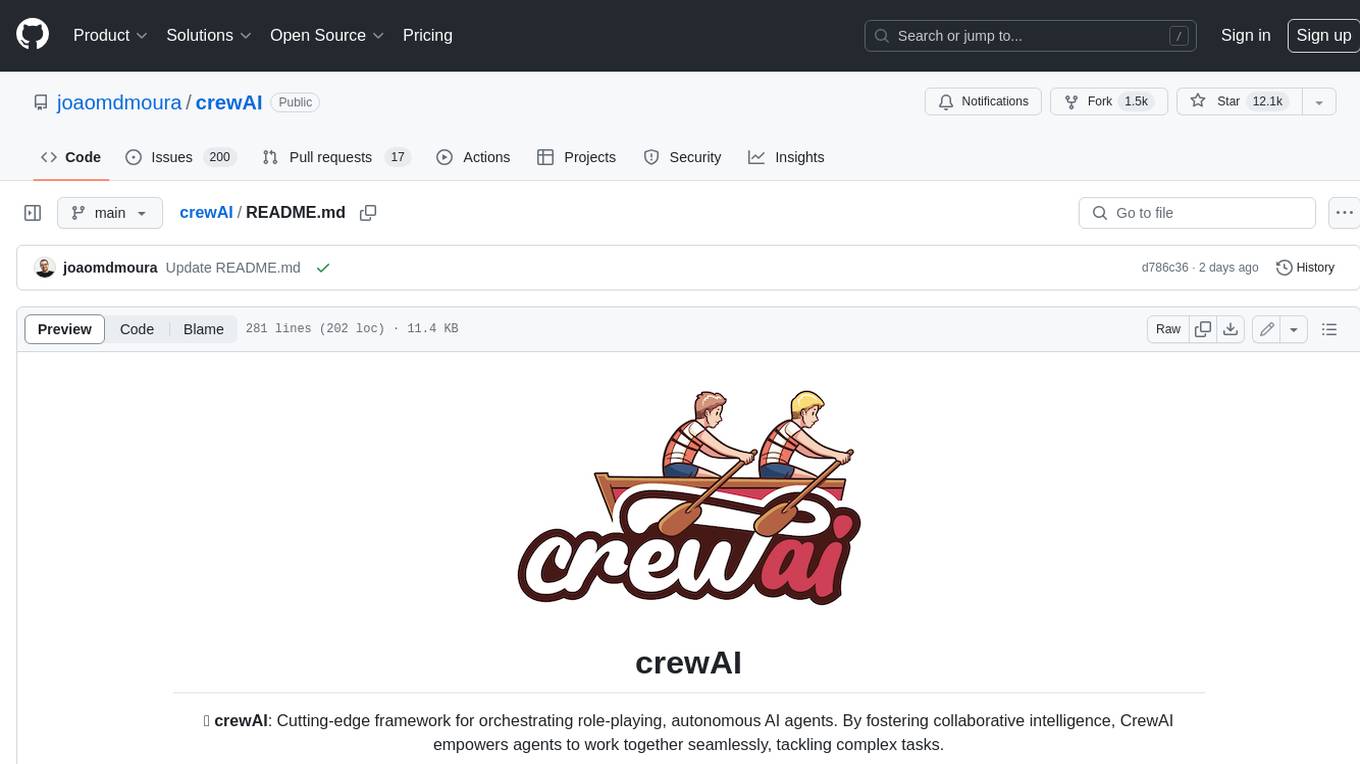
crewAI
crewAI is a cutting-edge framework for orchestrating role-playing, autonomous AI agents. By fostering collaborative intelligence, CrewAI empowers agents to work together seamlessly, tackling complex tasks. It provides a flexible and structured approach to AI collaboration, enabling users to define agents with specific roles, goals, and tools, and assign them tasks within a customizable process. crewAI supports integration with various LLMs, including OpenAI, and offers features such as autonomous task delegation, flexible task management, and output parsing. It is open-source and welcomes contributions, with a focus on improving the library based on usage data collected through anonymous telemetry.
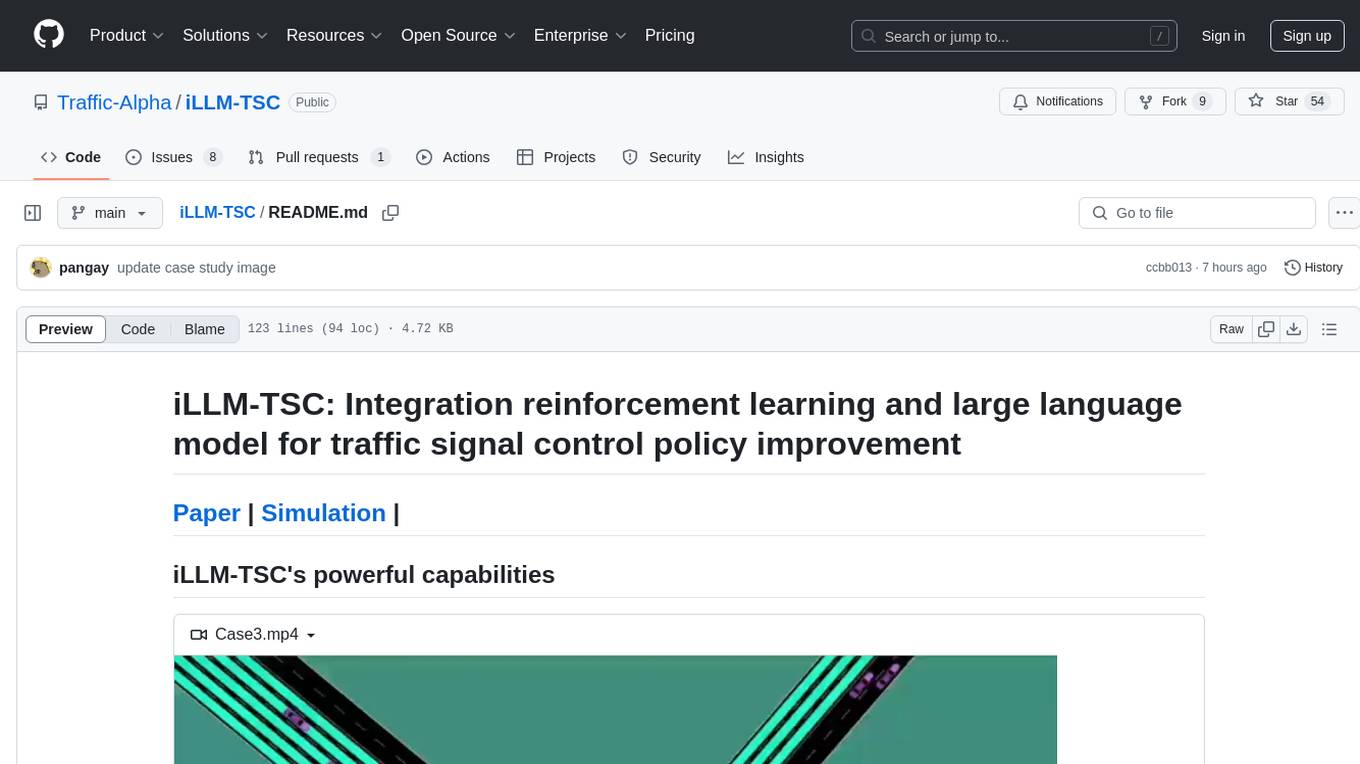
iLLM-TSC
iLLM-TSC is a framework that integrates reinforcement learning and large language models for traffic signal control policy improvement. It refines RL decisions based on real-world contexts and provides reasonable actions when RL agents make erroneous decisions. The framework includes cases where the large language model provides explanations and recommendations for RL agent actions, such as prioritizing emergency vehicles at intersections. Users can install and run the framework locally to train RL models and evaluate the combined RL+LLM approach.
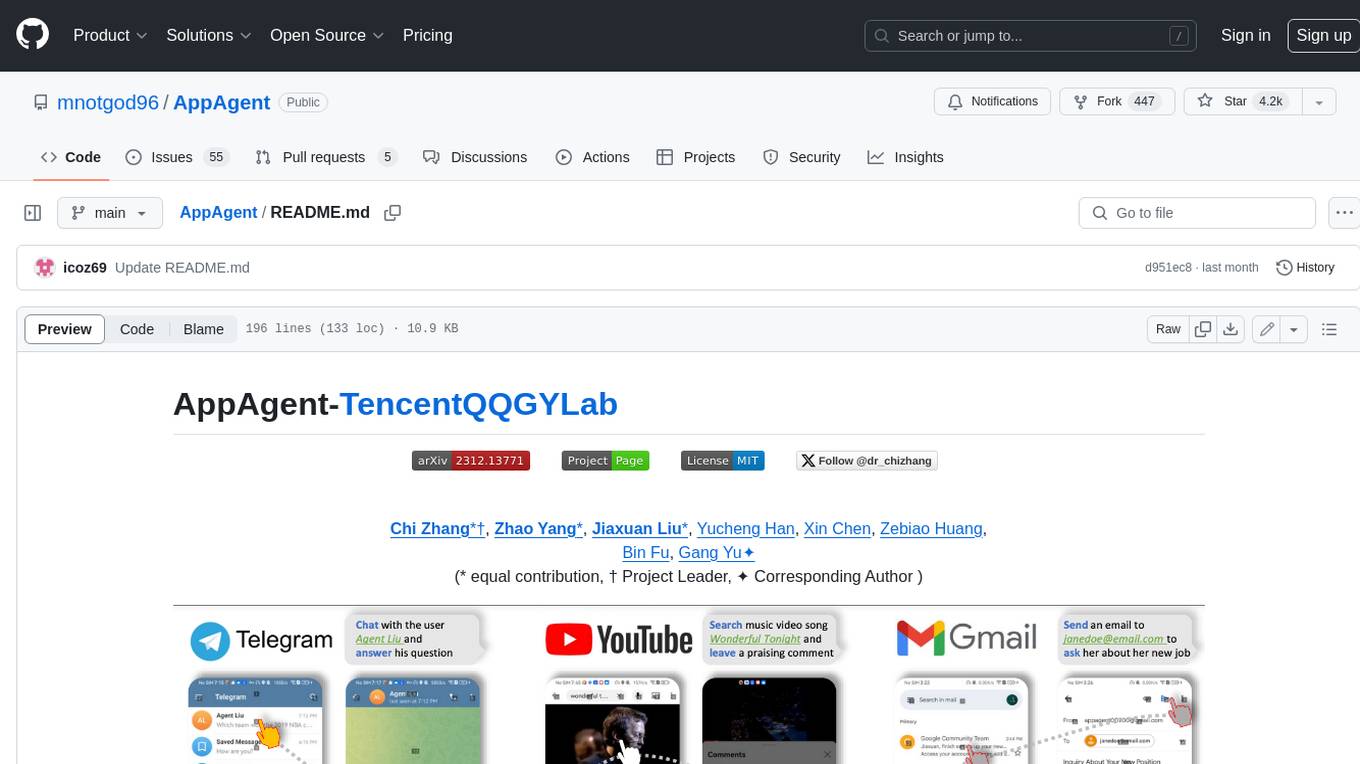
AppAgent
AppAgent is a novel LLM-based multimodal agent framework designed to operate smartphone applications. Our framework enables the agent to operate smartphone applications through a simplified action space, mimicking human-like interactions such as tapping and swiping. This novel approach bypasses the need for system back-end access, thereby broadening its applicability across diverse apps. Central to our agent's functionality is its innovative learning method. The agent learns to navigate and use new apps either through autonomous exploration or by observing human demonstrations. This process generates a knowledge base that the agent refers to for executing complex tasks across different applications.
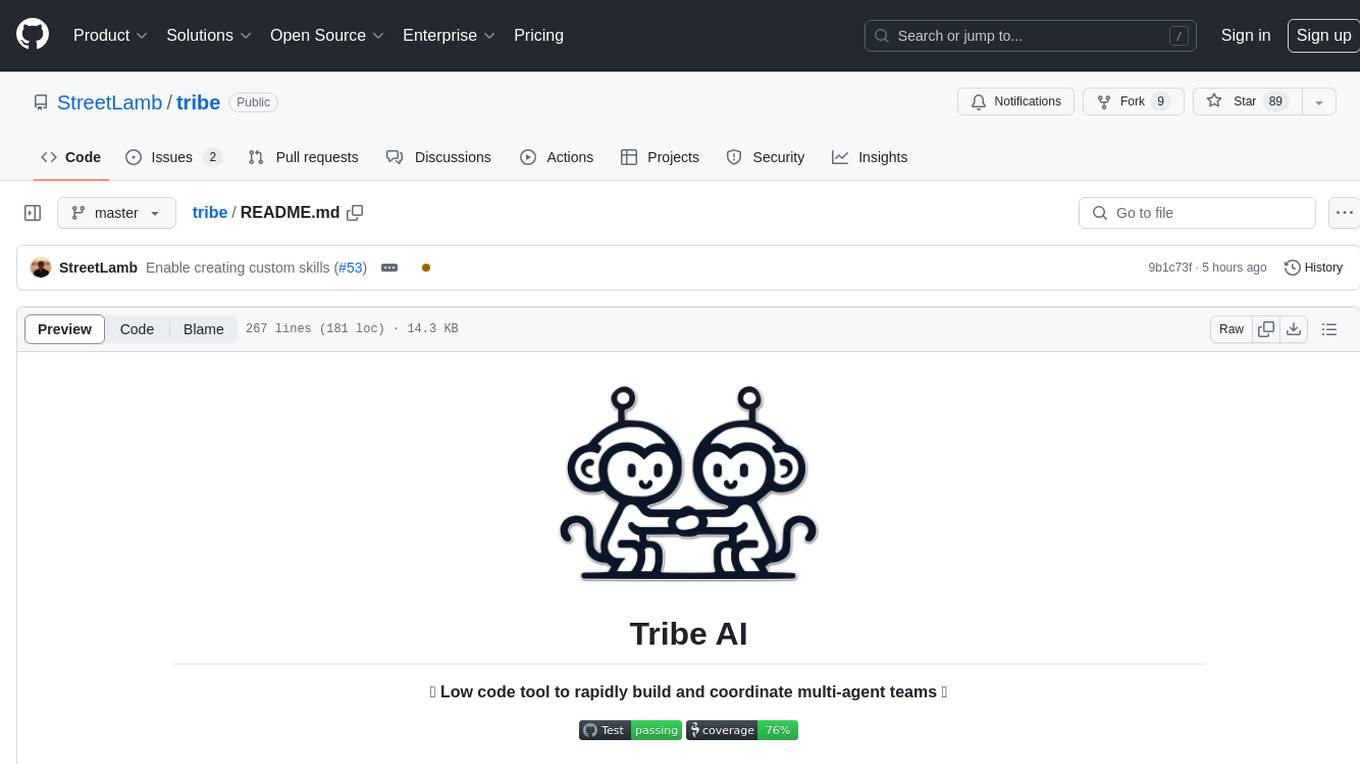
tribe
Tribe AI is a low code tool designed to rapidly build and coordinate multi-agent teams. It leverages the langgraph framework to customize and coordinate teams of agents, allowing tasks to be split among agents with different strengths for faster and better problem-solving. The tool supports persistent conversations, observability, tool calling, human-in-the-loop functionality, easy deployment with Docker, and multi-tenancy for managing multiple users and teams.
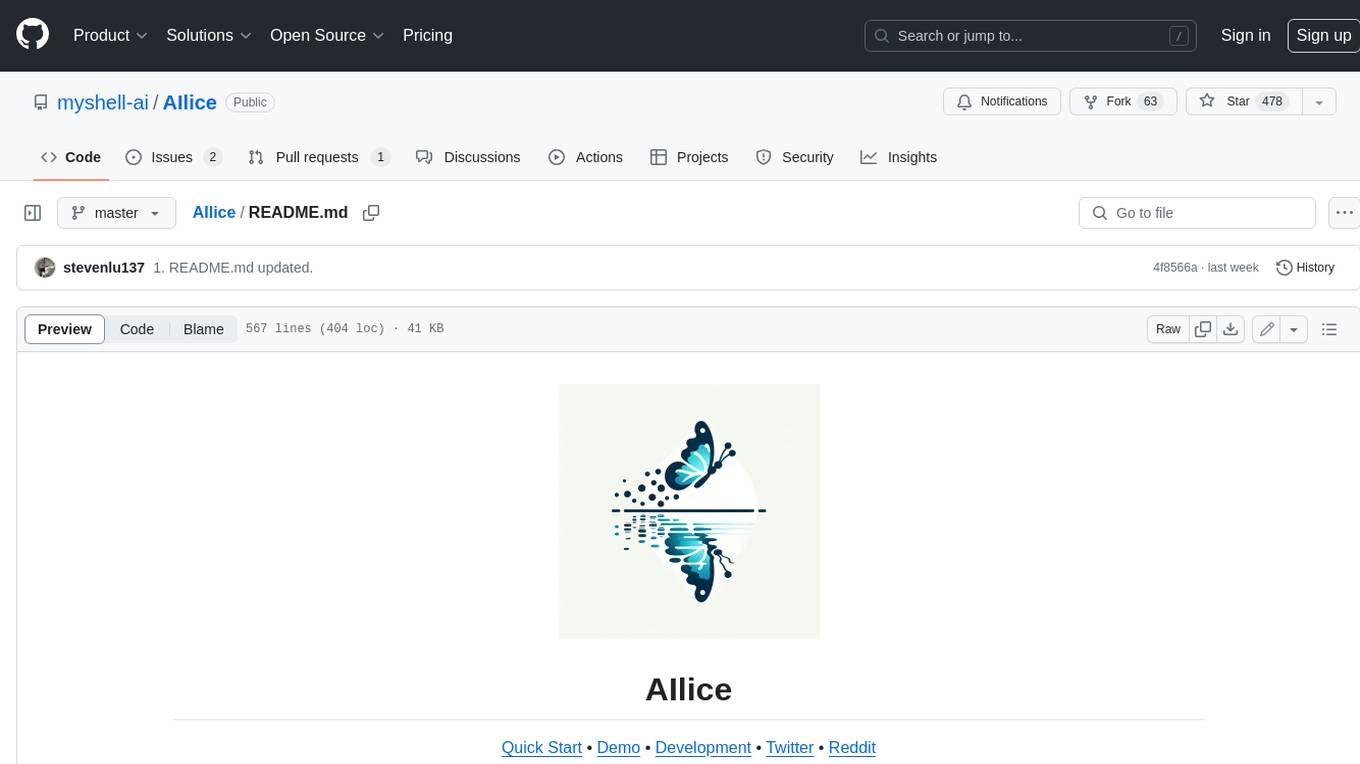
AIlice
AIlice is a fully autonomous, general-purpose AI agent that aims to create a standalone artificial intelligence assistant, similar to JARVIS, based on the open-source LLM. AIlice achieves this goal by building a "text computer" that uses a Large Language Model (LLM) as its core processor. Currently, AIlice demonstrates proficiency in a range of tasks, including thematic research, coding, system management, literature reviews, and complex hybrid tasks that go beyond these basic capabilities. AIlice has reached near-perfect performance in everyday tasks using GPT-4 and is making strides towards practical application with the latest open-source models. We will ultimately achieve self-evolution of AI agents. That is, AI agents will autonomously build their own feature expansions and new types of agents, unleashing LLM's knowledge and reasoning capabilities into the real world seamlessly.
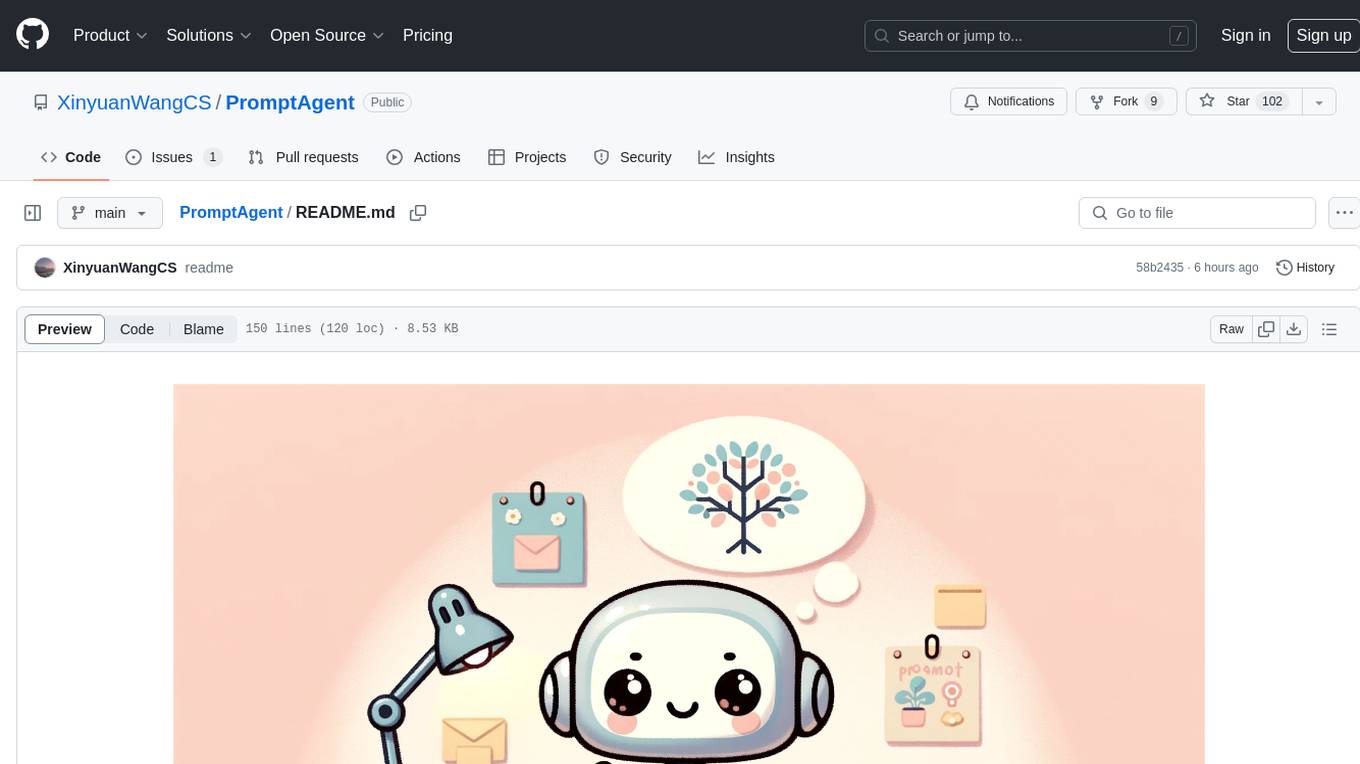
PromptAgent
PromptAgent is a repository for a novel automatic prompt optimization method that crafts expert-level prompts using language models. It provides a principled framework for prompt optimization by unifying prompt sampling and rewarding using MCTS algorithm. The tool supports different models like openai, palm, and huggingface models. Users can run PromptAgent to optimize prompts for specific tasks by strategically sampling model errors, generating error feedbacks, simulating future rewards, and searching for high-reward paths leading to expert prompts.
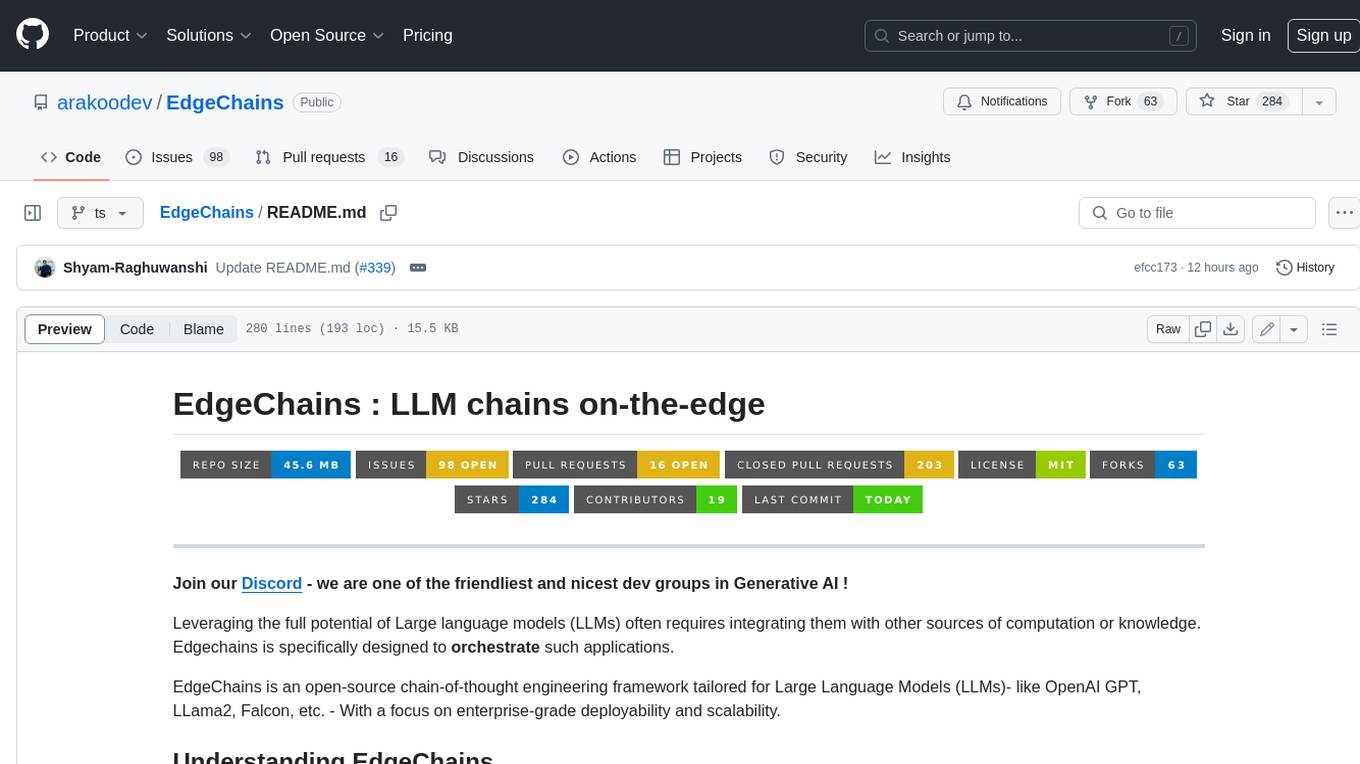
EdgeChains
EdgeChains is an open-source chain-of-thought engineering framework tailored for Large Language Models (LLMs)- like OpenAI GPT, LLama2, Falcon, etc. - With a focus on enterprise-grade deployability and scalability. EdgeChains is specifically designed to **orchestrate** such applications. At EdgeChains, we take a unique approach to Generative AI - we think Generative AI is a deployment and configuration management challenge rather than a UI and library design pattern challenge. We build on top of a tech that has solved this problem in a different domain - Kubernetes Config Management - and bring that to Generative AI. Edgechains is built on top of jsonnet, originally built by Google based on their experience managing a vast amount of configuration code in the Borg infrastructure.
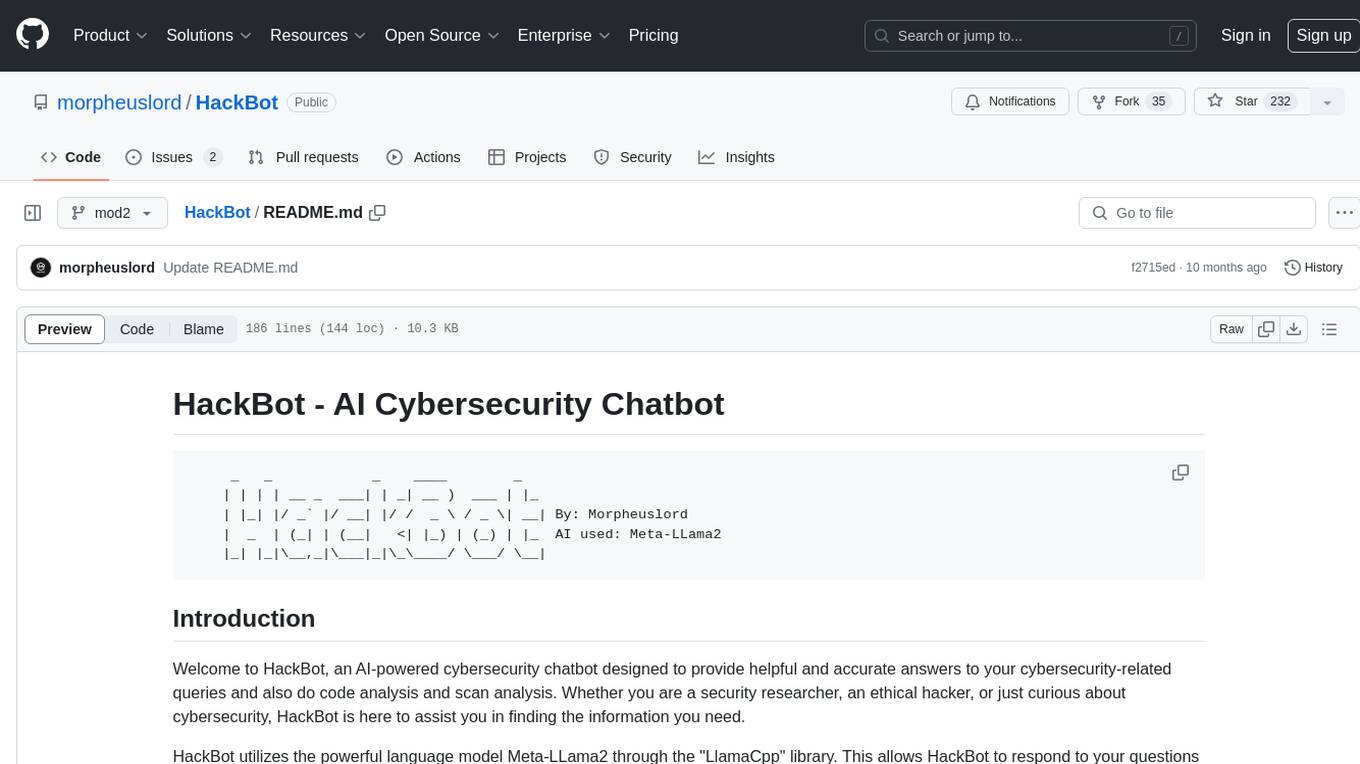
HackBot
HackBot is an AI-powered cybersecurity chatbot designed to provide accurate answers to cybersecurity-related queries, conduct code analysis, and scan analysis. It utilizes the Meta-LLama2 AI model through the 'LlamaCpp' library to respond coherently. The chatbot offers features like local AI/Runpod deployment support, cybersecurity chat assistance, interactive interface, clear output presentation, static code analysis, and vulnerability analysis. Users can interact with HackBot through a command-line interface and utilize it for various cybersecurity tasks.
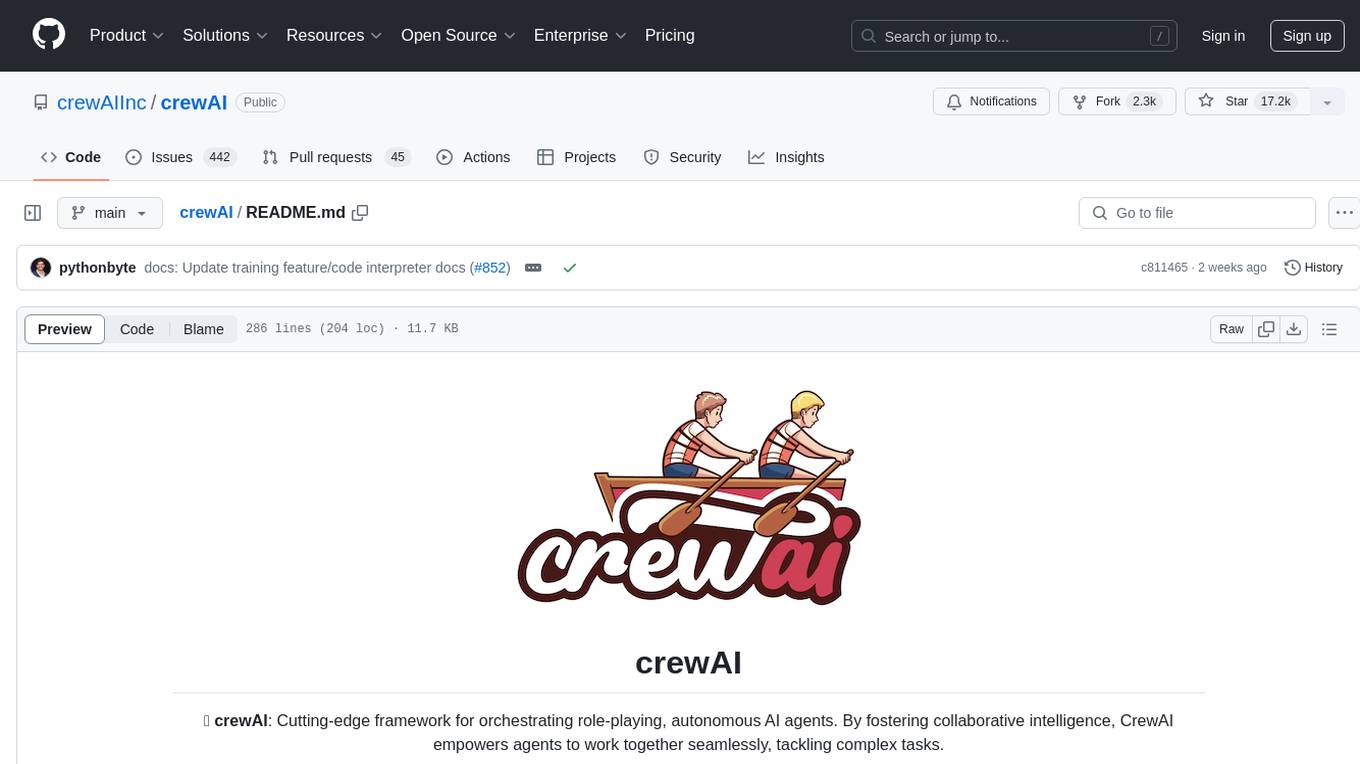
crewAI
CrewAI is a cutting-edge framework designed to orchestrate role-playing autonomous AI agents. By fostering collaborative intelligence, CrewAI empowers agents to work together seamlessly, tackling complex tasks. It enables AI agents to assume roles, share goals, and operate in a cohesive unit, much like a well-oiled crew. Whether you're building a smart assistant platform, an automated customer service ensemble, or a multi-agent research team, CrewAI provides the backbone for sophisticated multi-agent interactions. With features like role-based agent design, autonomous inter-agent delegation, flexible task management, and support for various LLMs, CrewAI offers a dynamic and adaptable solution for both development and production workflows.

project_alice
Alice is an agentic workflow framework that integrates task execution and intelligent chat capabilities. It provides a flexible environment for creating, managing, and deploying AI agents for various purposes, leveraging a microservices architecture with MongoDB for data persistence. The framework consists of components like APIs, agents, tasks, and chats that interact to produce outputs through files, messages, task results, and URL references. Users can create, test, and deploy agentic solutions in a human-language framework, making it easy to engage with by both users and agents. The tool offers an open-source option, user management, flexible model deployment, and programmatic access to tasks and chats.
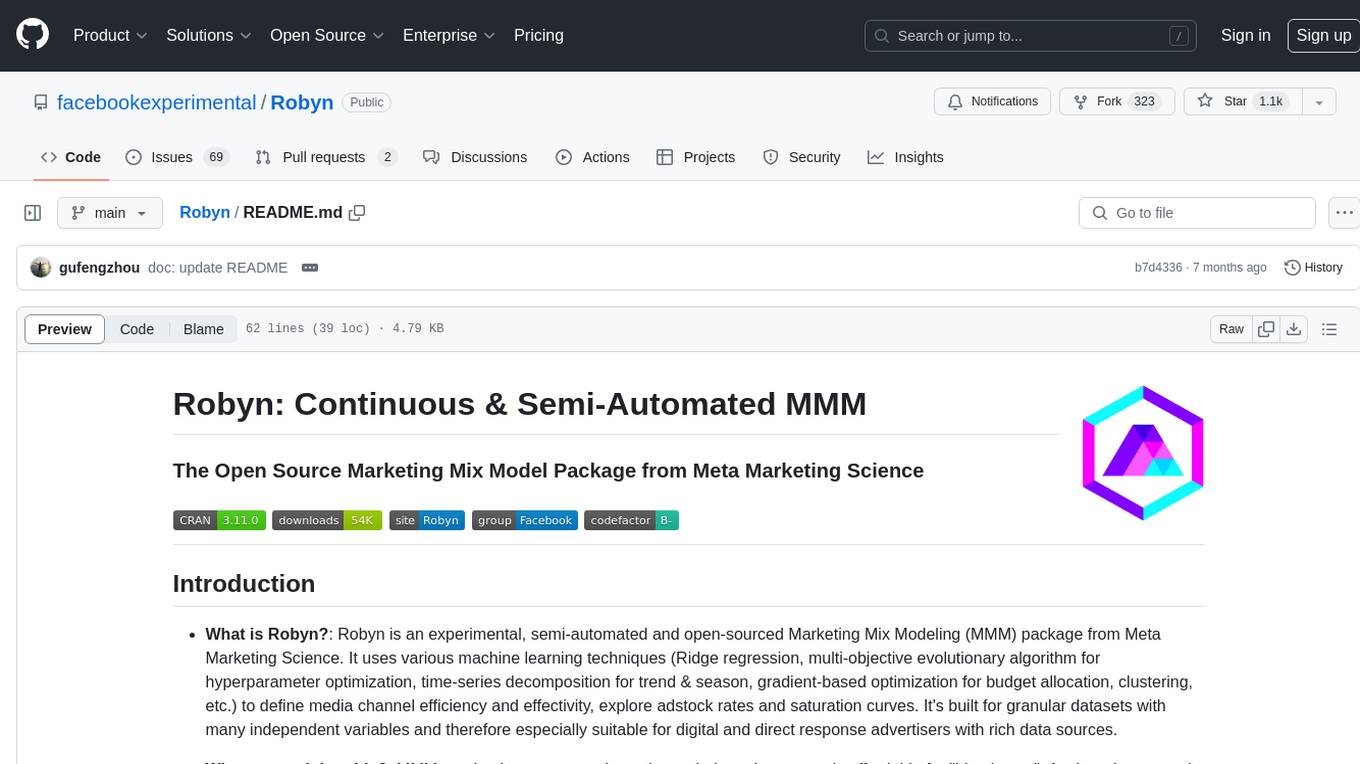
Robyn
Robyn is an experimental, semi-automated and open-sourced Marketing Mix Modeling (MMM) package from Meta Marketing Science. It uses various machine learning techniques to define media channel efficiency and effectivity, explore adstock rates and saturation curves. Built for granular datasets with many independent variables, especially suitable for digital and direct response advertisers with rich data sources. Aiming to democratize MMM, make it accessible for advertisers of all sizes, and contribute to the measurement landscape.
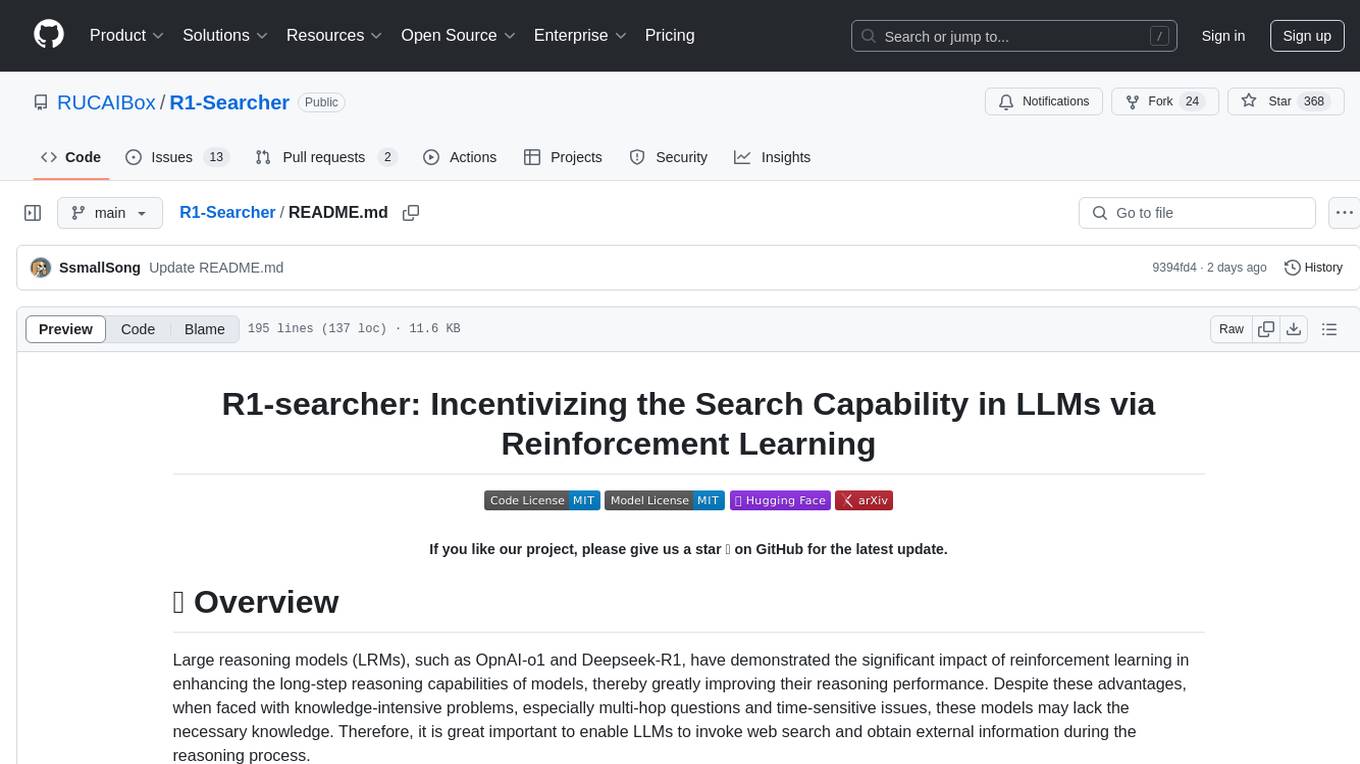
R1-Searcher
R1-searcher is a tool designed to incentivize the search capability in large reasoning models (LRMs) via reinforcement learning. It enables LRMs to invoke web search and obtain external information during the reasoning process by utilizing a two-stage outcome-supervision reinforcement learning approach. The tool does not require instruction fine-tuning for cold start and is compatible with existing Base LLMs or Chat LLMs. It includes training code, inference code, model checkpoints, and a detailed technical report.
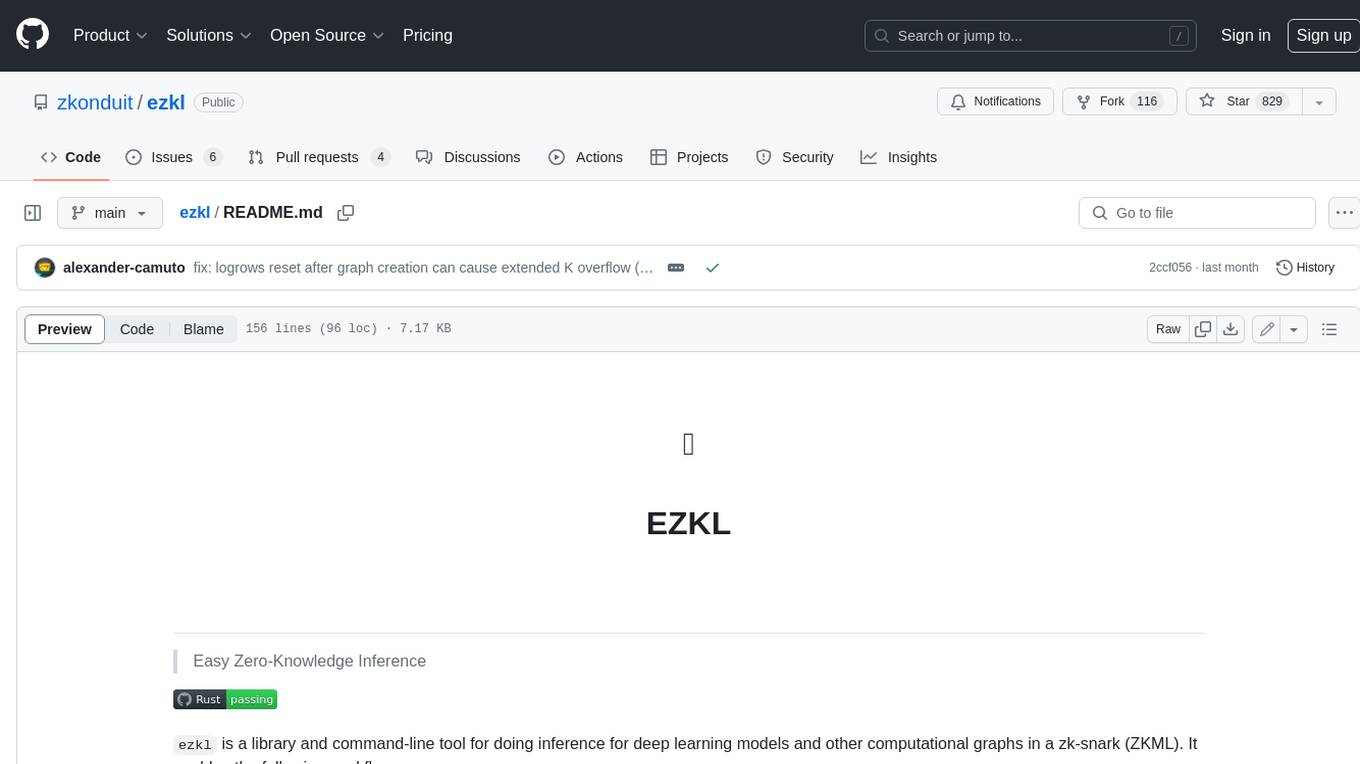
ezkl
EZKL is a library and command-line tool for doing inference for deep learning models and other computational graphs in a zk-snark (ZKML). It enables the following workflow: 1. Define a computational graph, for instance a neural network (but really any arbitrary set of operations), as you would normally in pytorch or tensorflow. 2. Export the final graph of operations as an .onnx file and some sample inputs to a .json file. 3. Point ezkl to the .onnx and .json files to generate a ZK-SNARK circuit with which you can prove statements such as: > "I ran this publicly available neural network on some private data and it produced this output" > "I ran my private neural network on some public data and it produced this output" > "I correctly ran this publicly available neural network on some public data and it produced this output" In the backend we use the collaboratively-developed Halo2 as a proof system. The generated proofs can then be verified with much less computational resources, including on-chain (with the Ethereum Virtual Machine), in a browser, or on a device.
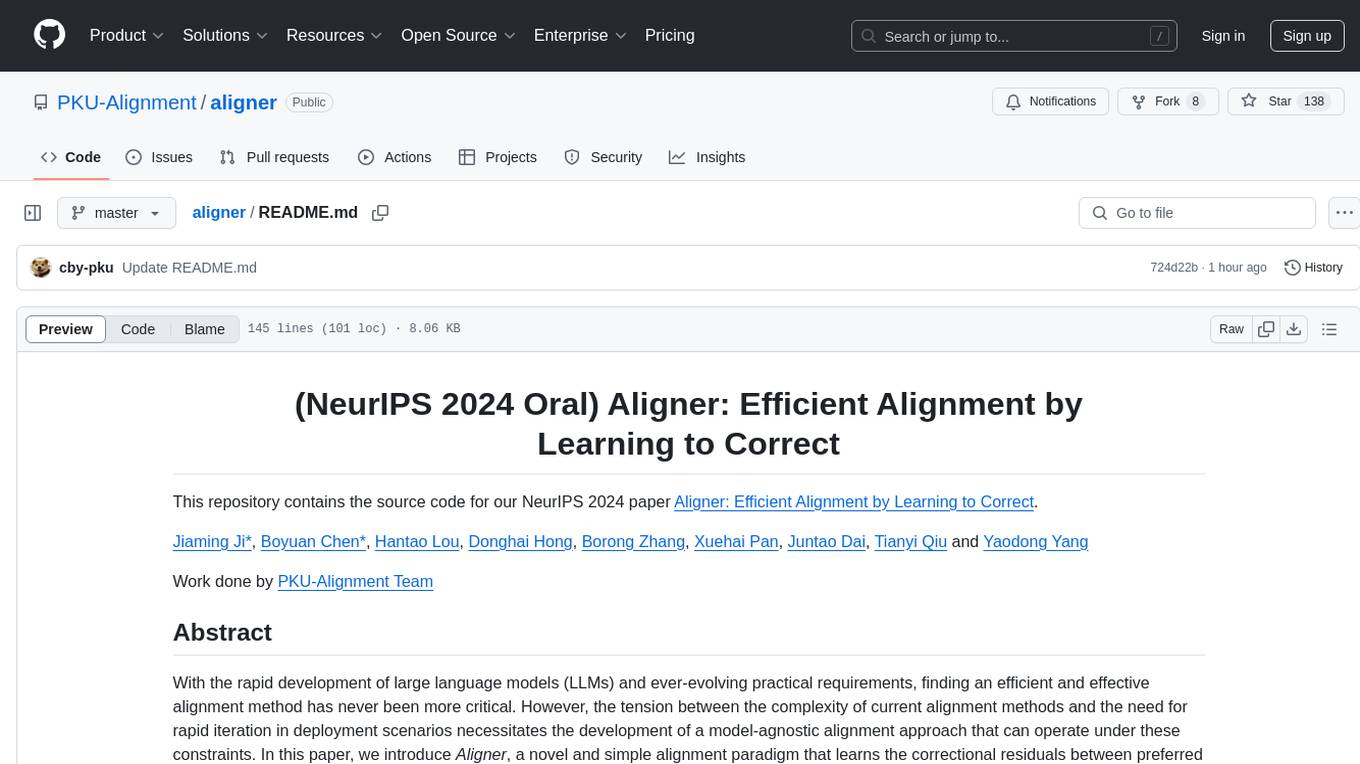
aligner
Aligner is a model-agnostic alignment tool designed to efficiently correct responses from large language models. It redistributes initial answers to align with human intentions, improving performance across various LLMs. The tool can be applied with minimal training, enhancing upstream models and reducing hallucination. Aligner's 'copy and correct' method preserves the base structure while enhancing responses. It achieves significant performance improvements in helpfulness, harmlessness, and honesty dimensions, with notable success in boosting Win Rates on evaluation leaderboards.
For similar tasks
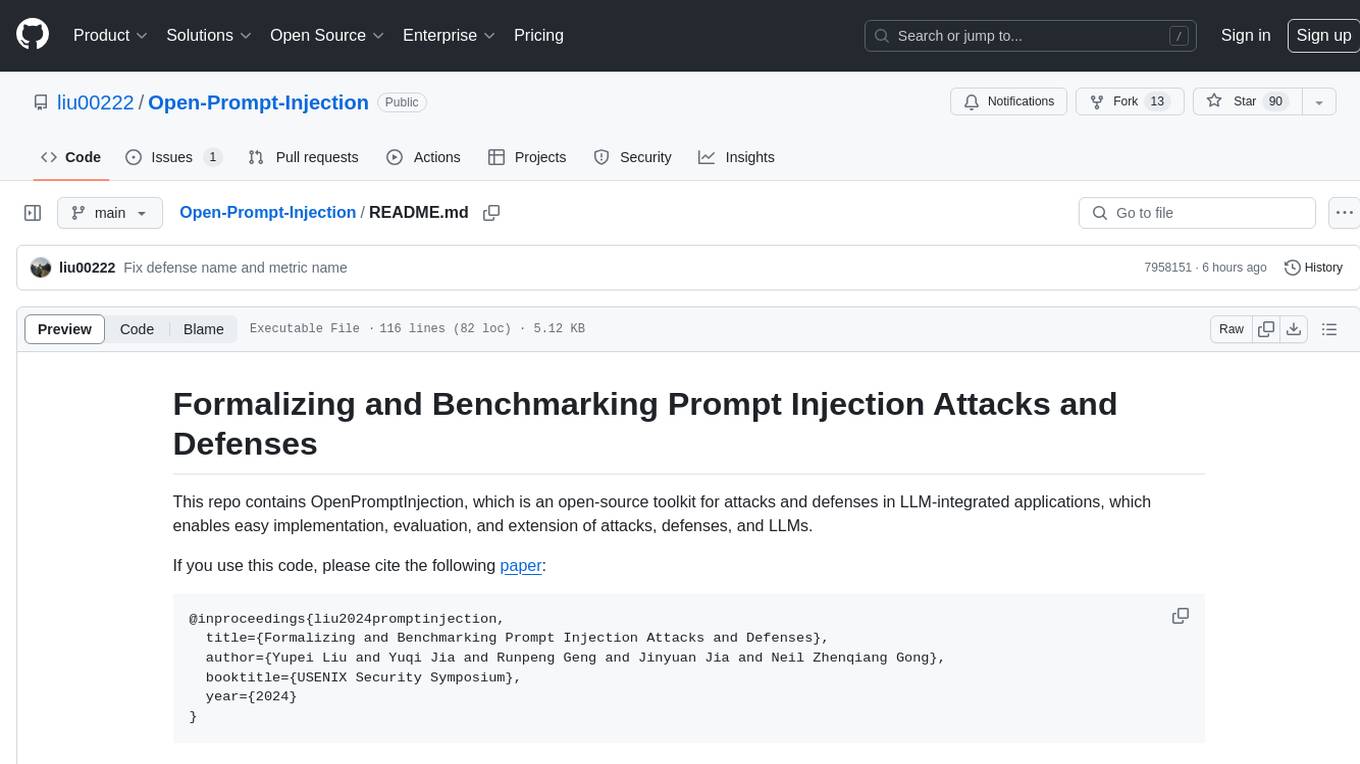
Open-Prompt-Injection
OpenPromptInjection is an open-source toolkit for attacks and defenses in LLM-integrated applications, enabling easy implementation, evaluation, and extension of attacks, defenses, and LLMs. It supports various attack and defense strategies, including prompt injection, paraphrasing, retokenization, data prompt isolation, instructional prevention, sandwich prevention, perplexity-based detection, LLM-based detection, response-based detection, and know-answer detection. Users can create models, tasks, and apps to evaluate different scenarios. The toolkit currently supports PaLM2 and provides a demo for querying models with prompts. Users can also evaluate ASV for different scenarios by injecting tasks and querying models with attacked data prompts.
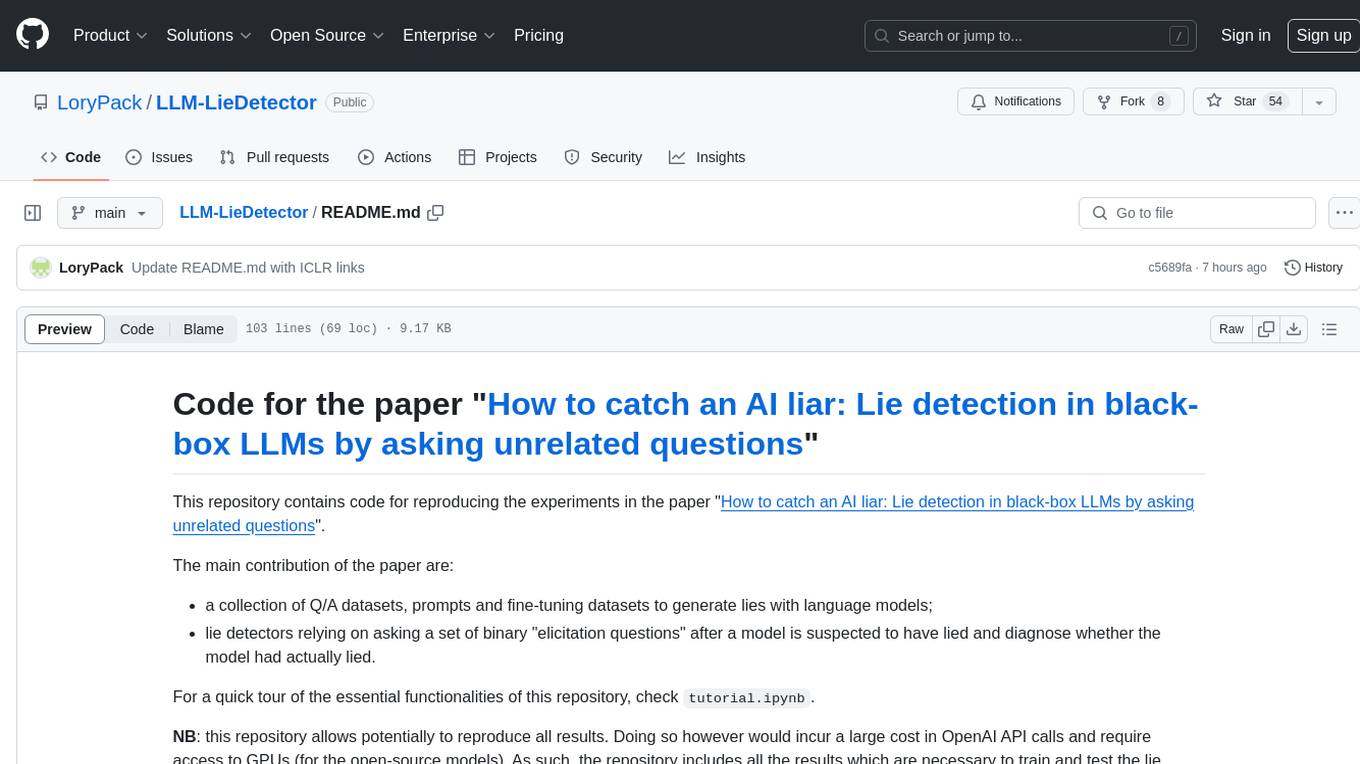
LLM-LieDetector
This repository contains code for reproducing experiments on lie detection in black-box LLMs by asking unrelated questions. It includes Q/A datasets, prompts, and fine-tuning datasets for generating lies with language models. The lie detectors rely on asking binary 'elicitation questions' to diagnose whether the model has lied. The code covers generating lies from language models, training and testing lie detectors, and generalization experiments. It requires access to GPUs and OpenAI API calls for running experiments with open-source models. Results are stored in the repository for reproducibility.
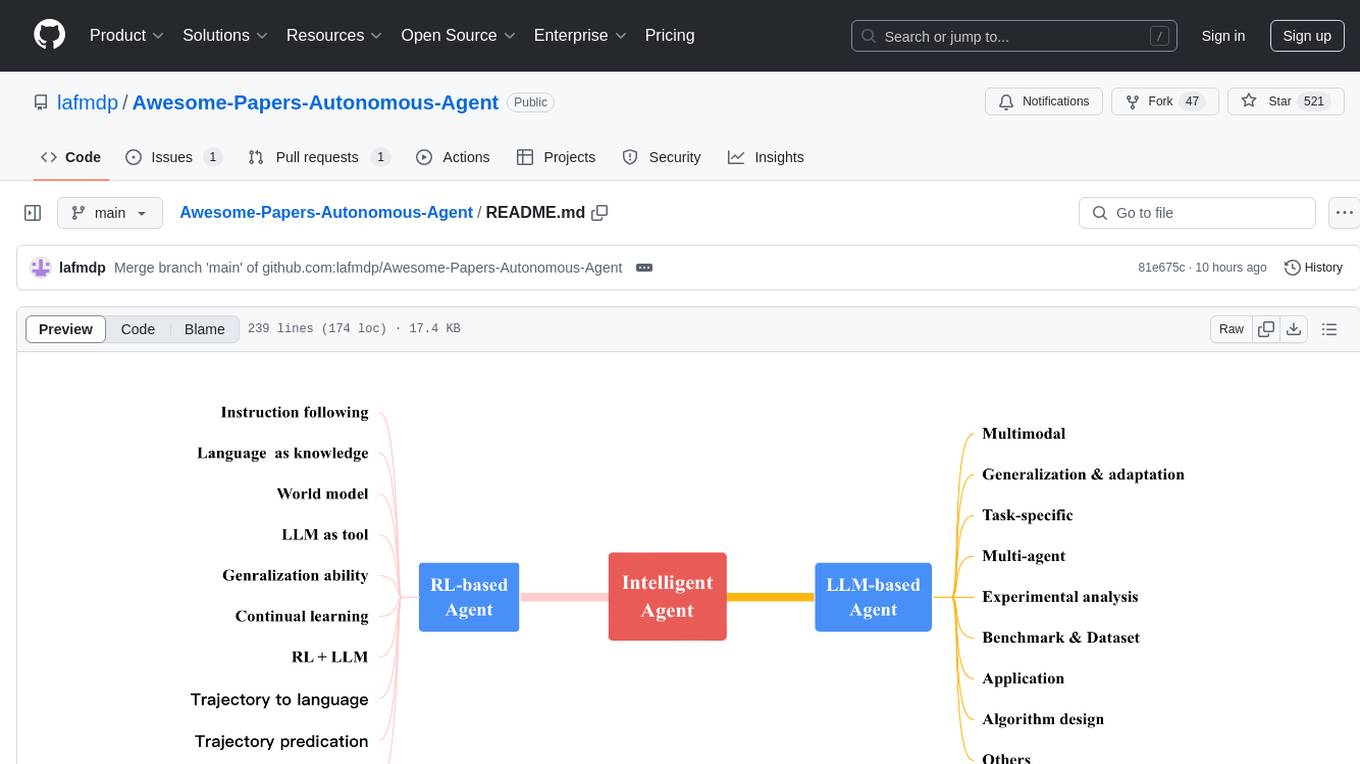
Awesome-Papers-Autonomous-Agent
Awesome-Papers-Autonomous-Agent is a curated collection of recent papers focusing on autonomous agents, specifically interested in RL-based agents and LLM-based agents. The repository aims to provide a comprehensive resource for researchers and practitioners interested in intelligent agents that can achieve goals, acquire knowledge, and continually improve. The collection includes papers on various topics such as instruction following, building agents based on world models, using language as knowledge, leveraging LLMs as a tool, generalization across tasks, continual learning, combining RL and LLM, transformer-based policies, trajectory to language, trajectory prediction, multimodal agents, training LLMs for generalization and adaptation, task-specific designing, multi-agent systems, experimental analysis, benchmarking, applications, algorithm design, and combining with RL.

SwiftSage
SwiftSage is a tool designed for conducting experiments in the field of machine learning and artificial intelligence. It provides a platform for researchers and developers to implement and test various algorithms and models. The tool is particularly useful for exploring new ideas and conducting experiments in a controlled environment. SwiftSage aims to streamline the process of developing and testing machine learning models, making it easier for users to iterate on their ideas and achieve better results. With its user-friendly interface and powerful features, SwiftSage is a valuable tool for anyone working in the field of AI and ML.
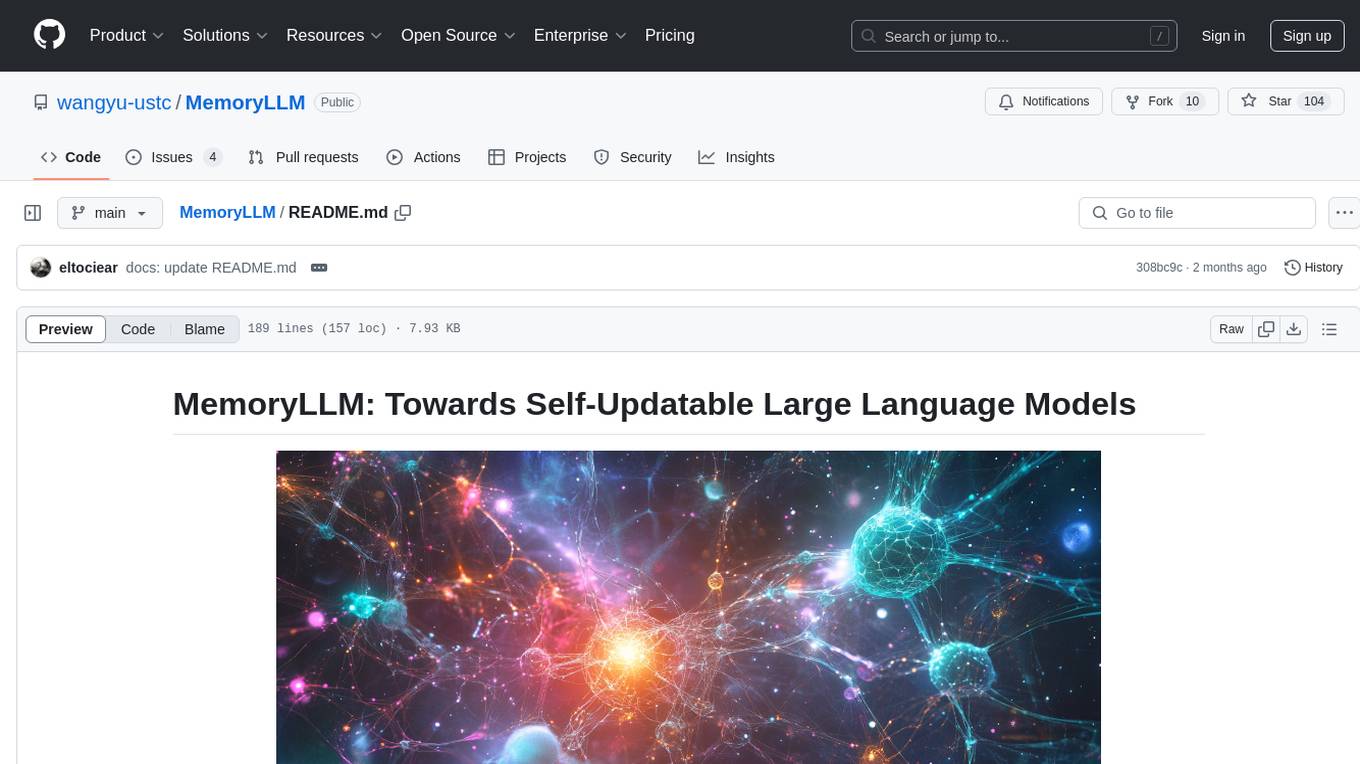
MemoryLLM
MemoryLLM is a large language model designed for self-updating capabilities. It offers pretrained models with different memory capacities and features, such as chat models. The repository provides training code, evaluation scripts, and datasets for custom experiments. MemoryLLM aims to enhance knowledge retention and performance on various natural language processing tasks.
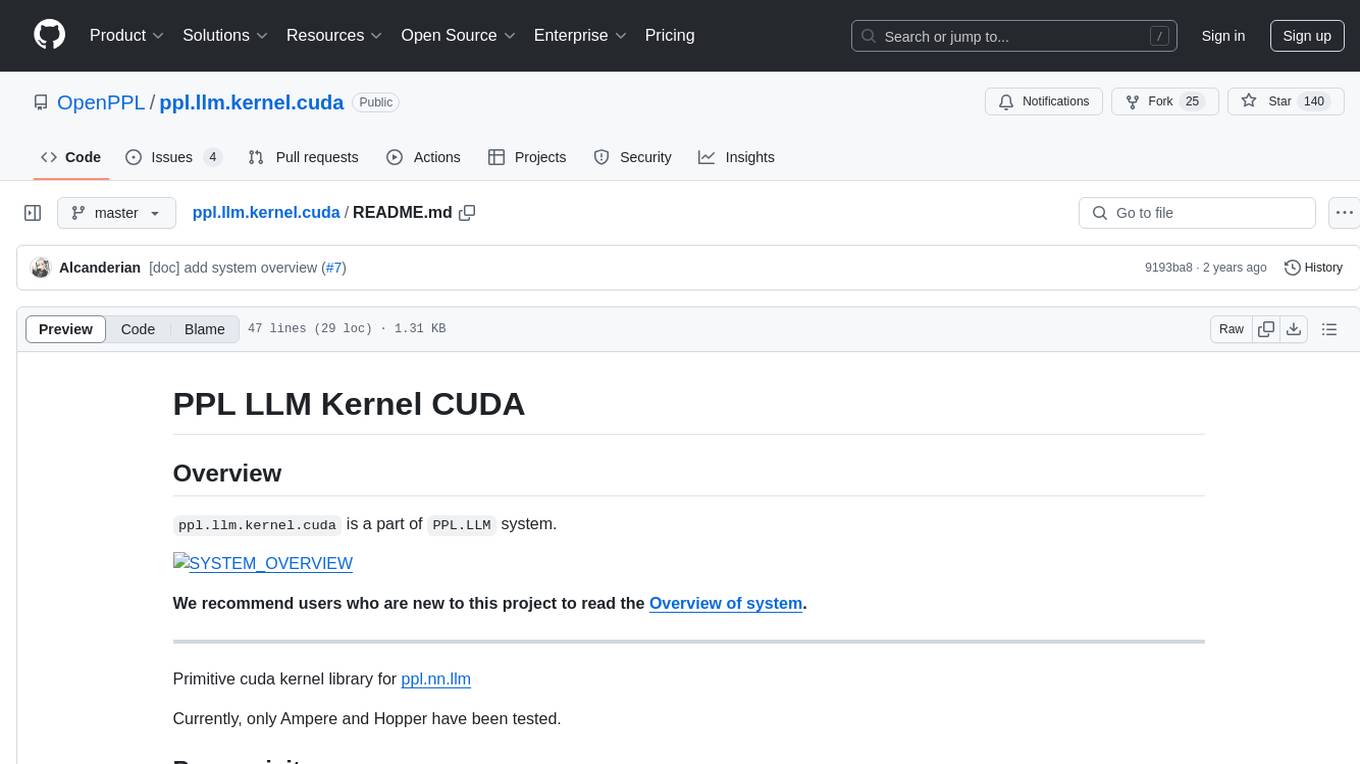
ppl.llm.kernel.cuda
Primitive cuda kernel library for ppl.nn.llm, part of PPL.LLM system, tested on Ampere and Hopper, requires Linux on x86_64 or arm64 CPUs, GCC >= 9.4.0, CMake >= 3.18, Git >= 2.7.0, CUDA Toolkit >= 11.4. 11.6 recommended. Provides cuda kernel functionalities for deep learning tasks.
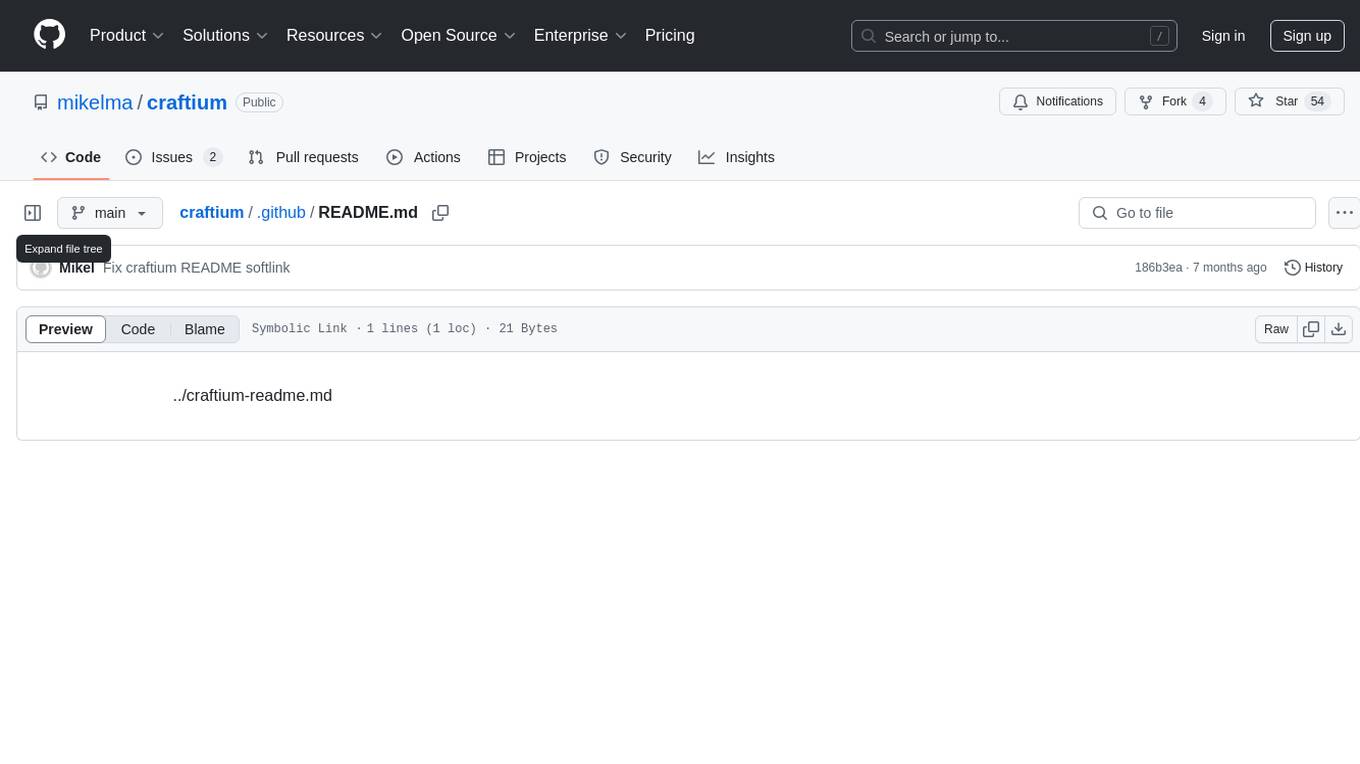
craftium
Craftium is an open-source platform based on the Minetest voxel game engine and the Gymnasium and PettingZoo APIs, designed for creating fast, rich, and diverse single and multi-agent environments. It allows for connecting to Craftium's Python process, executing actions as keyboard and mouse controls, extending the Lua API for creating RL environments and tasks, and supporting client/server synchronization for slow agents. Craftium is fully extensible, extensively documented, modern RL API compatible, fully open source, and eliminates the need for Java. It offers a variety of environments for research and development in reinforcement learning.
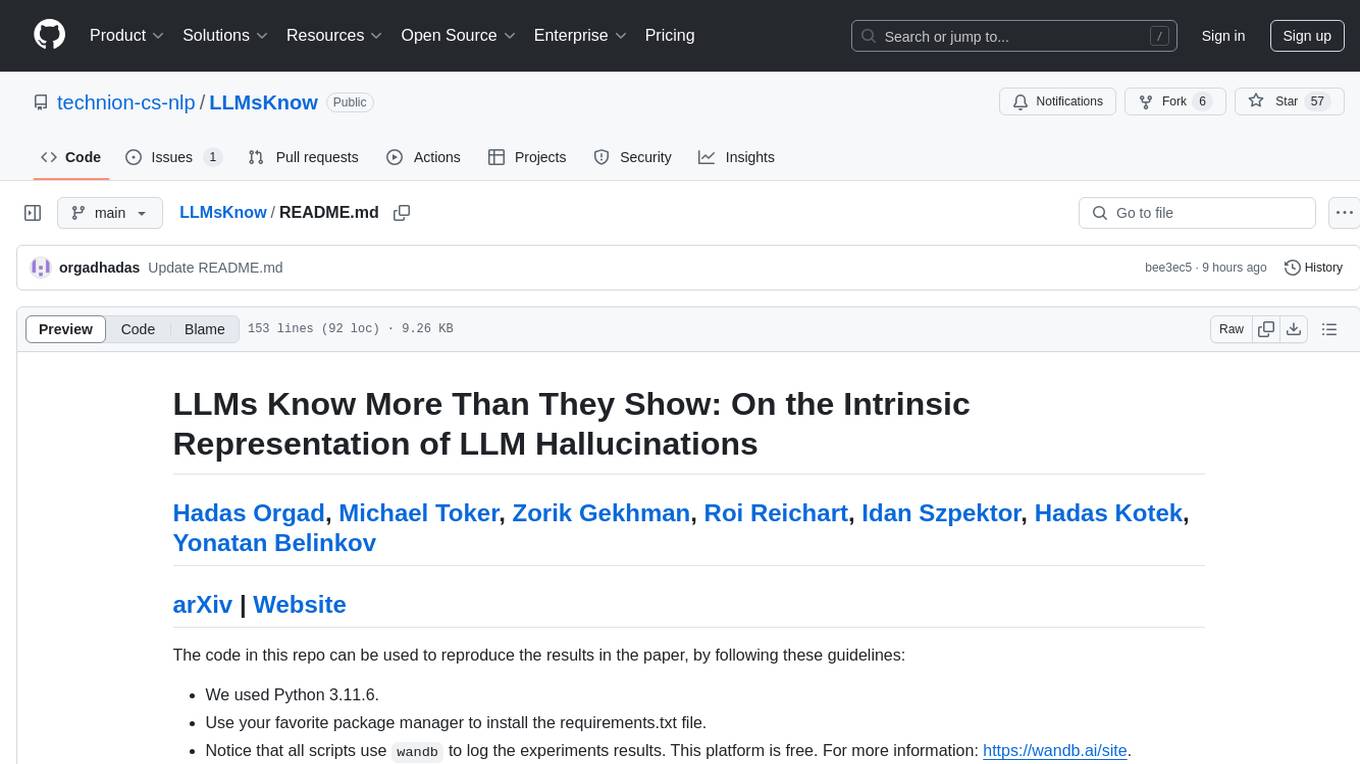
LLMsKnow
LLMs Know More Than They Show is a repository containing code to reproduce the results in the paper. It includes scripts to generate model answers, extract exact answers, probe all layers and tokens, probe specific layers and tokens, conduct generalization experiments, perform resampling for error type probing and answer selection experiments, and run other baselines like logprob detection and p_true detection. The repository supports various datasets such as TriviaQA, Movies, HotpotQA, Winobias, Winogrande, NLI, IMDB, Math, and Natural questions. It also provides supported models like Mistral-7B-Instruct-v0.2, Mistral-7B-v0.3, Meta-Llama-3-8B, and Meta-Llama-3-8B-Instruct.
For similar jobs

promptflow
**Prompt flow** is a suite of development tools designed to streamline the end-to-end development cycle of LLM-based AI applications, from ideation, prototyping, testing, evaluation to production deployment and monitoring. It makes prompt engineering much easier and enables you to build LLM apps with production quality.

deepeval
DeepEval is a simple-to-use, open-source LLM evaluation framework specialized for unit testing LLM outputs. It incorporates various metrics such as G-Eval, hallucination, answer relevancy, RAGAS, etc., and runs locally on your machine for evaluation. It provides a wide range of ready-to-use evaluation metrics, allows for creating custom metrics, integrates with any CI/CD environment, and enables benchmarking LLMs on popular benchmarks. DeepEval is designed for evaluating RAG and fine-tuning applications, helping users optimize hyperparameters, prevent prompt drifting, and transition from OpenAI to hosting their own Llama2 with confidence.

MegaDetector
MegaDetector is an AI model that identifies animals, people, and vehicles in camera trap images (which also makes it useful for eliminating blank images). This model is trained on several million images from a variety of ecosystems. MegaDetector is just one of many tools that aims to make conservation biologists more efficient with AI. If you want to learn about other ways to use AI to accelerate camera trap workflows, check out our of the field, affectionately titled "Everything I know about machine learning and camera traps".

leapfrogai
LeapfrogAI is a self-hosted AI platform designed to be deployed in air-gapped resource-constrained environments. It brings sophisticated AI solutions to these environments by hosting all the necessary components of an AI stack, including vector databases, model backends, API, and UI. LeapfrogAI's API closely matches that of OpenAI, allowing tools built for OpenAI/ChatGPT to function seamlessly with a LeapfrogAI backend. It provides several backends for various use cases, including llama-cpp-python, whisper, text-embeddings, and vllm. LeapfrogAI leverages Chainguard's apko to harden base python images, ensuring the latest supported Python versions are used by the other components of the stack. The LeapfrogAI SDK provides a standard set of protobuffs and python utilities for implementing backends and gRPC. LeapfrogAI offers UI options for common use-cases like chat, summarization, and transcription. It can be deployed and run locally via UDS and Kubernetes, built out using Zarf packages. LeapfrogAI is supported by a community of users and contributors, including Defense Unicorns, Beast Code, Chainguard, Exovera, Hypergiant, Pulze, SOSi, United States Navy, United States Air Force, and United States Space Force.

llava-docker
This Docker image for LLaVA (Large Language and Vision Assistant) provides a convenient way to run LLaVA locally or on RunPod. LLaVA is a powerful AI tool that combines natural language processing and computer vision capabilities. With this Docker image, you can easily access LLaVA's functionalities for various tasks, including image captioning, visual question answering, text summarization, and more. The image comes pre-installed with LLaVA v1.2.0, Torch 2.1.2, xformers 0.0.23.post1, and other necessary dependencies. You can customize the model used by setting the MODEL environment variable. The image also includes a Jupyter Lab environment for interactive development and exploration. Overall, this Docker image offers a comprehensive and user-friendly platform for leveraging LLaVA's capabilities.

carrot
The 'carrot' repository on GitHub provides a list of free and user-friendly ChatGPT mirror sites for easy access. The repository includes sponsored sites offering various GPT models and services. Users can find and share sites, report errors, and access stable and recommended sites for ChatGPT usage. The repository also includes a detailed list of ChatGPT sites, their features, and accessibility options, making it a valuable resource for ChatGPT users seeking free and unlimited GPT services.

TrustLLM
TrustLLM is a comprehensive study of trustworthiness in LLMs, including principles for different dimensions of trustworthiness, established benchmark, evaluation, and analysis of trustworthiness for mainstream LLMs, and discussion of open challenges and future directions. Specifically, we first propose a set of principles for trustworthy LLMs that span eight different dimensions. Based on these principles, we further establish a benchmark across six dimensions including truthfulness, safety, fairness, robustness, privacy, and machine ethics. We then present a study evaluating 16 mainstream LLMs in TrustLLM, consisting of over 30 datasets. The document explains how to use the trustllm python package to help you assess the performance of your LLM in trustworthiness more quickly. For more details about TrustLLM, please refer to project website.

AI-YinMei
AI-YinMei is an AI virtual anchor Vtuber development tool (N card version). It supports fastgpt knowledge base chat dialogue, a complete set of solutions for LLM large language models: [fastgpt] + [one-api] + [Xinference], supports docking bilibili live broadcast barrage reply and entering live broadcast welcome speech, supports Microsoft edge-tts speech synthesis, supports Bert-VITS2 speech synthesis, supports GPT-SoVITS speech synthesis, supports expression control Vtuber Studio, supports painting stable-diffusion-webui output OBS live broadcast room, supports painting picture pornography public-NSFW-y-distinguish, supports search and image search service duckduckgo (requires magic Internet access), supports image search service Baidu image search (no magic Internet access), supports AI reply chat box [html plug-in], supports AI singing Auto-Convert-Music, supports playlist [html plug-in], supports dancing function, supports expression video playback, supports head touching action, supports gift smashing action, supports singing automatic start dancing function, chat and singing automatic cycle swing action, supports multi scene switching, background music switching, day and night automatic switching scene, supports open singing and painting, let AI automatically judge the content.
